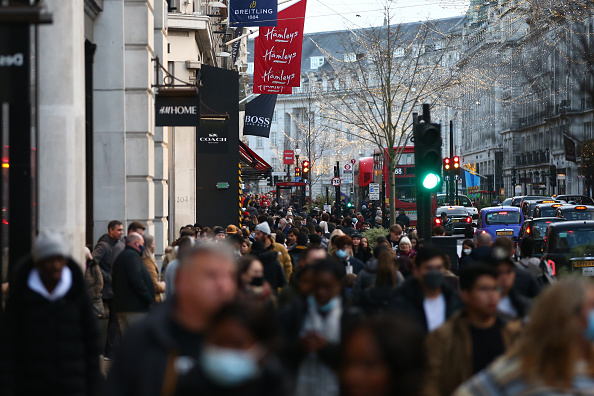UK economy to shrug off Omicron quickly but lean into inflation blizzard

The UK economy will shrug off the impact of the Omicron variant quickly, but will then fall into an inflation blizzard, top City economists have bet.
Despite widespread concerns the new strain would plunge the economy back into doldrums seen during previous periods of high virus cases, the impact of the Omicron variant will be mild.
Covid-19 cases are seemingly peaking in London, the capital’s health chief said this week, in a sign that the UK government’s decision to stick to plan B has paid off.
The likelihood of further curbs on daily life being introduced has receded significantly, igniting a string of bullish assessments from top City experts on the UK economy’s prospects.
“The worst of the Omicron wave now is behind Britain,” said Smauel Tombs, chief UK economist at Pantheon Macroeconomics, adding he now expects plan B measures to expire at the end of January.
The economy has snapped back sharply after previous waves of the virus have filtered through the country, indicating output will propel higher beyond January. Pantheon have hiked their forecasts for UK economic growth for the first three months of the year to 0.2 per cent from zero.
Andrew Goodwin, chief UK economist at Oxford Economics, said: “With Omicron rapidly moving through the population, this wave should prove short-lived.”
“Activity is likely to rebound strongly as case numbers fall, so GDP should return to pre-Omicron levels in early spring.”
“Restrictions now look likely to be soft in scale and shorter in duration, with the economy potentially reversing restrictions over the next month,” said Sanjay Raja, senior economist at Deutsche Bank, said:
Most in the City now think the economy will hit pre-pandemic strength in the first half of 2022.
In a sign that Britain’s recovery was already steaming ahead before the emergence of Omicron, Friday’s GDP print is expected to come in strong.
Analysts at investment bank Deutsche Bank are pencilling the economy to expand 0.4 per cent in November, up from 0.1 per cent in October, driven by a rise in consumer spending.
However, the soaring cost of living is now seen as the number one risk to derailing Britain’s recovery among experts.
“It’s highly unlikely that pay will keep pace with price gains for most (if not all) of this year. That will cap consumer spending growth,” warned James Smith, developed market economist at ING.
Some experts in the City think inflation could top seven per cent this April, led higher by the energy watchdog, Ofgem, hiking the cap on energy bills 50 per cent.